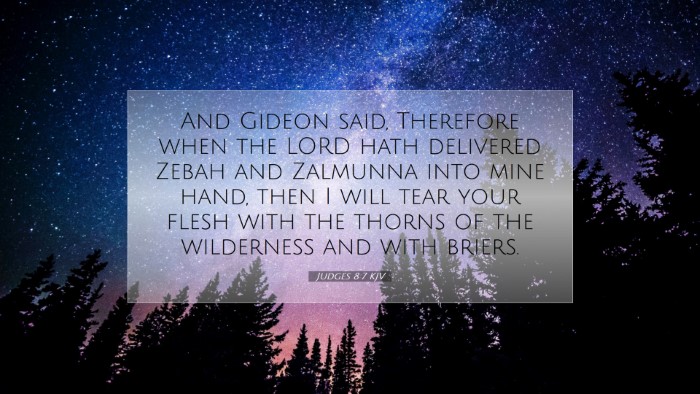Bible Commentary on Judges 8:7
Judges 8:7 captures a critical moment in the life of Gideon as he responds to the men of Succoth who refused to provide sustenance for his weary troops. The verse states:
"And Gideon said, Therefore when the Lord hath delivered Zebah and Zalmunna into mine hand, then I will tear your flesh with the thorns of the wilderness and with briers."
This verse reflects Gideon's righteous indignation and the seriousness of his mission as he faces the Midianites.
Contextual Overview
The context of this verse lies within Gideon's campaign against the Midianites. After God called Gideon to deliver Israel, he assembled an army, but the Lord reduced it to a mere 300 men to ensure the glory would belong to God. This incident highlights the ongoing struggle between Israel and the foreign oppression of the Midianites, as well as the theme of faith and reliance on God’s strength.
Insights from Public Domain Commentaries
Matthew Henry's Commentary
Matthew Henry emphasizes the significance of Gideon's anger towards the men of Succoth. He notes that their refusal to assist Gideon stems from a lack of faith in God's deliverance, illustrating a spiritual condition prevalent among the Israelites at the time. Henry points out that Gideon’s response is not merely one of personal offense but serves as a poignant comment on faithlessness in the face of divine victory.
-
Faith and Commitment: Henry remarks that Gideon's threat is grounded in the expectation of a forthcoming victory. His reference to tearing their flesh symbolizes the severity of their lack of commitment to God’s cause.
-
Public Accountability: Henry highlights Gideon’s role as a judge committed to upholding God’s honor. By confronting the people of Succoth, Gideon reaffirms that obedience to God must be reflected in practical support for God’s chosen leader.
Albert Barnes' Notes on the Bible
Albert Barnes provides a thorough analysis of the historical consequences of Gideon’s pronouncement. He elaborates that Gideon’s use of “thorns of the wilderness” serves as a metaphor for the severe punishment that would impact the community for their indifference. Barnes discusses how Gideon’s words foreshadow an inevitable confrontation, suggesting that those who turn away from righteous leadership may face dire consequences.
-
Judicial Response: Barnes notes that Gideon’s threat serves as a judicial reaction to the ongoing transgressions among the Israelites and underscores the necessity of obedience to divine calling.
-
The Nature of Divine Justice: He further elaborates that such a response is not devoid of mercy; rather, it illustrates the seriousness of divine justice in the socio-religious life of Israel.
Adam Clarke's Commentary
Adam Clarke offers a distinct perspective on the symbolism of thorns and briers. He reflects on the nature of the punishment as indicative of the judgment that falls upon those who resist divine order. Clarke underscores the literal and metaphorical implications of Gideon’s words, implying that a life away from seeking the Lord invites suffering and hardship.
-
Symbolism of Thorns: Clarke illuminates how thorns represent pain, suffering, and regret—a poignant reminder of the consequences of rejecting God’s providence.
-
Community and Responsibility: He argues that Gideon’s expression encapsulates a broader theological theme regarding the communal responsibilities of the people of God. Those who disregard the call to support God's work risk falling into calamity.
Theological Implications
The implications of Judges 8:7 extend beyond historical context into theology and ethics. For pastors, students, and scholars, this passage offers a profound exploration of biblical leadership and community accountability.
-
Leadership in the Community: The necessity for leaders to maintain fidelity to God's call reflects a broader teaching on spiritual leadership and the expectations of those under their guidance. Gideon’s actions serve as a model for understanding the responsibilities of spiritual leaders in holding community members accountable.
-
Faith and Obedience: This verse prompts reflection on the connection between faith and obedience. It challenges believers to consider how their support for God’s work manifests in day-to-day life and decisions.
-
Judgment and Mercy: The balance of judgment and mercy is also illustrated—the warning Gideon presents is harsh yet reflects a desire for restoration. It serves as a reminder that God desires repentance and obedience rather than mere punishment.
Conclusion
Judges 8:7 serves as a significant moment in Gideon's narrative, richly layered with themes of faith, accountability, and divine justice. By combining insights from Matthew Henry, Albert Barnes, and Adam Clarke, one can grasp the multifaceted lessons embedded within this scripture. It calls for introspection on individual and communal responsibilities within the faith community, emphasizing that leaders and congregants alike must align themselves with God's mission.


